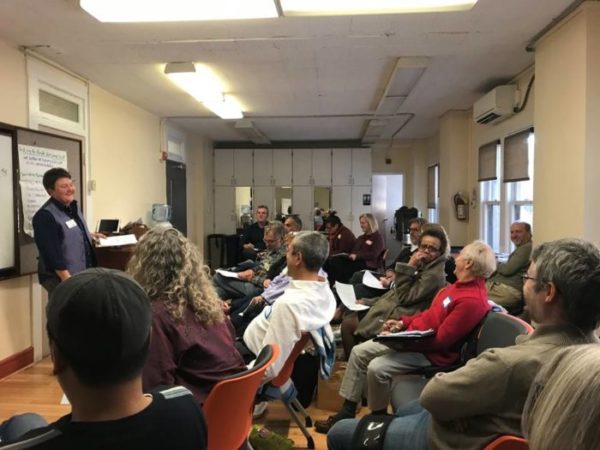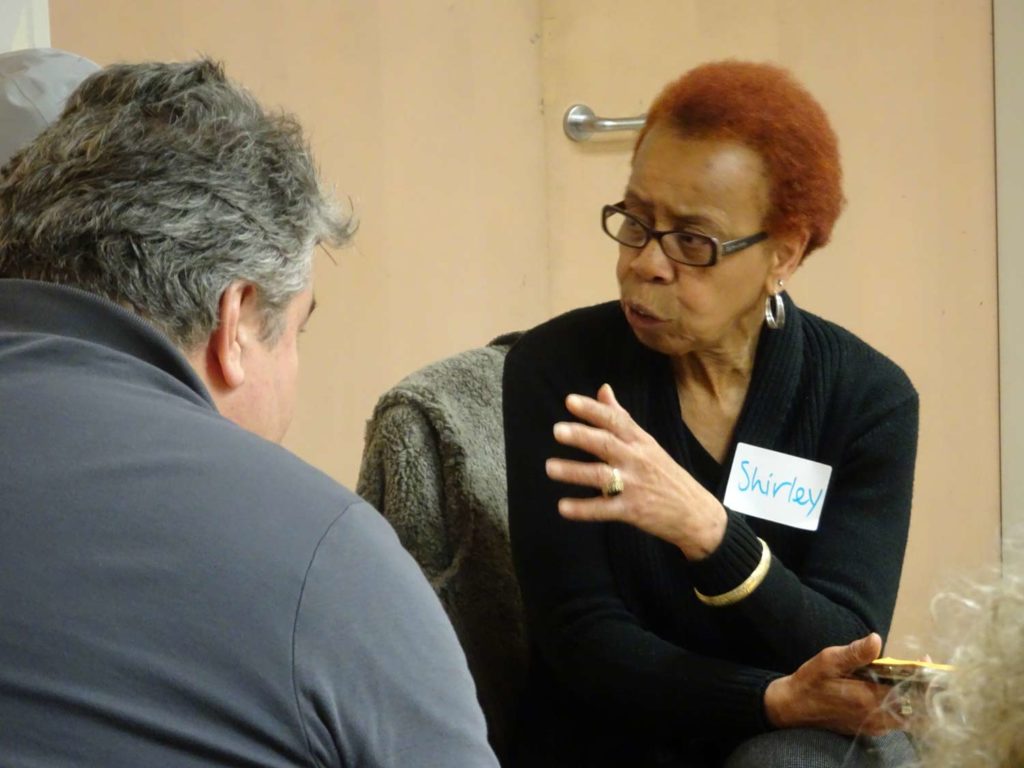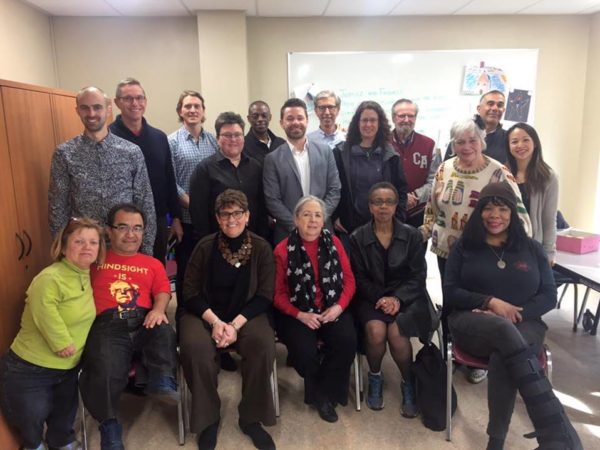Four years in, GLIDE Church’s congregational life group devoted to “courageous conversation” across the divides has learned a thing or two
At GLIDE Memorial Church, we practice unconditional love. More than a mere platitude, unconditional love is an ethics. It teaches us that difference does not make someone fall out of the boundaries of beloved community. Unconditional love says difference is what will allow us to cover more creative, spiritual, philosophical, and political ground. In Different Together conversation circles, progressive and conservative, Republican and Democrat, learn to listen without judgement or losing ground of their beliefs. Instead, the participants dismantle the walls of racial, social, economic, and political histories that have kept people separated into ideological enemies. The work of Different Together creates a space of vulnerability and truth. It’s okay to be affiliated, enlisted, or a member of the winning or the losing party. It’s not okay to launch from that win or loss, into hate. Whether online or in-person it’s the “Together,” of “Different Together,” that brings people into proximity to all of humanity and back from the brink of our mutual annihilation.
Marvin K. White, Minister of Celebration
The following conversation with Different Together co-founders and facilitators Chris Collins and Winne Fink was conducted by Rob Avila and Casey Zhao from the communications team in December 2020. It has been lightly edited for length and clarity.
Different Together (originally called Bridging the Divide) is a congregational life group at GLIDE Memorial Church that formed after the last election in 2016. How do you describe the project and what are some of the foundational texts or guideposts you use?
Chris: I say that we create opportunities for courageous conversation between people who might not otherwise interact or might avoid each other. Much of that is the progressive and conservative divide, but it doesn’t necessarily stop there. That does not fully capture what our divisions are. Our divisions are also across race, across class, across religion. We try to be mindful of that and bring that in as part of our focus and our conversations.

Was there one book or source that served as an initial framework for the group?
Chris: There are several books. One was by a sociologist named Jonathan Haidt called The Righteous Mind: Why Good People Are Divided by Politics and Religion. There’s one [by Jason J. Jay and Gabriel Grant] called Breaking Through Gridlock: The Power of Conversation in a Polarized World. Roadmap to Reconciliation [by Brenda Salter McNeil] was another book that I consulted. So there have been a few that were instrumental.
While you bring up books: I was also looking for a book that could help guide me through all this and I wasn’t really finding the one that I felt I really needed, so I’ve written my own. It’s actually being published in January. Hopefully, that will be a foundational text for other groups that want to do similar work across the country. I talk a lot about GLIDE in it and how GLIDE was a perfect place for a radically inclusive community to also be radically inclusive to people across the political divide as well. It’s based on my experience and the collective experience of the group, which I try to share.
Winnie: We did start with books and we started with a workshop format for GLIDE-only folks, having discussions by using a particular author’s approach/theory. And I’m smiling because leading an in-depth discussion of a formal theory is not as comfortable for me. So when Chris said we’re going to workshop, Winnie, we’re going to use the Righteous Mind. I was like, Oh Lord. So that was learning for me. But I think we’ve also just evolved by realizing what people have really liked—when we do topics like gun control or taxes, those have been successful; the one we did on health care was really hot. That was probably our first one that was particularly contentious. We had a lot of on-the-ground learning about how to deal with that.
How do you deal with a contentious issue like that?
Winnie: You know, we do this thing on social media where you just one-dimensionalize the other side. They’re an asshole. It just becomes that simple. We’ve really tried to do a lot to get people to use empathy and turn it around. The interesting thing for me doing this project at GLIDE is that, yes, we say we’re inclusive, but it’s really been about people who are struggling the most. Right? We’ve not necessarily made a lot of effort [to reach] people who might have privilege the other way, or who might not be the ones that care in the same way or in the way that we think is enough or right.

Tell me about the meeting that you held the day before Election Day?
Chris: The idea came about that the night before the election is going to be one that was going to be anxiety-filled for everybody, no matter where you fall on the political spectrum. Especially for us on the progressive side, we don’t know what’s going to happen, it’s probably not going to be pretty. No matter what the outcome of the election is, there are a lot of unknowns. Unlike any other year. So we wanted to have some sort of event where we can come and be grounded as we enter Election Day.
We developed this conversation that would have an arc to it. Just to give you a sense of the structure of how we do this: We have a group of 33 people, we have some opening remarks, we present a question, we break up into small groups of four, come back as a big group. There’s a little bit of a debrief, and the next question, then you’re in a new group. We did that for a series of questions. What gives you anxiety about what’s to come? What has given you hope over the last few years?
Winnie: We’ve been doing this enough where one of us, usually it’s Chris but I will also facilitate, we just sort of take it, we own it, we have a conversation, and we go. With this one we were extra thoughtful, careful. [Minister] Marvin opened us. David Fredrickson, he teaches mindfulness and compassion, he did a closing for us. As we return to the big group, we have people react in writing. We’ve learned that the more we can interact, and the more modalities we can learn, the better the experience is for folks. The idea is really getting people to be thoughtful and hear from each other and realize what I’m worried about is also what they’re worried about, and they think totally differently than I do. Get people to put their curiosity and empathy hats on, which is what the whole project is. Just very simply: be curious, be kind. It’s not that complicated but we don’t it very well collectively.
Chris: The conversation ended on a note of, How do you want to be treated if your candidate doesn’t win? How will you treat other people if your candidate does win? It was naming the anxiety that’s there, naming how you feel about other people who disagree with you (that was one of the questions), and put all answers into the space and, in the end: OK, how do you want to be treated and how are you going to treat other people? Speaking personally, I felt that, going to bed that night, because of this event, I felt warmth, I had a full heart. That sense of community, across the political lines, before what was most likely going to be a toxic election, was very, very meaningful for me and I heard that reflected in many people that were there.
Now that we are passed the election, what lies ahead for the group?
Winnie: I think there’s some learning to do. For me, I joined [four years ago] because I didn’t know what to do with myself after the election, I was in anguish, lost, didn’t understand. I thought about where I grew up in a small town in Kansas knowing many or most of those folks who voted for Trump. That’s where most of us who wound up in that room from GLIDE [were coming from]. We just got whupped. How that felt.
Now I think there’s learning to be done on the other side of that. I don’t think what we have ahead is anything that radical other than keep going, be kind, and be curious. I don’t think it’s much harder than that. But figuring out how to do it—I do think what we’re really clear on is that we’re still ridiculously polarized. There are still so many people who don’t participate. At least on the left. My circles, most of my friends are pretty lefty, it’s hard to get them to come. They’re like, I can’t talk to those people. It’s hard for me to get my friends to participate. So, we’ve got work to do. I also think that it’s largely been the privileged arm of GLIDE membership who have participated so I’d be very interested in also expanding our membership and reach.
Chris: I think that’s beautifully said. I would also like to see us continuing to do outreach across the country and finding a church community in the South or somewhere that’s not anything like San Francisco and having a series of conversations with them. Maybe a series of three conversations. That type of outreach. Sometimes the conservative attendance is low, sometimes it’s not that bad. What we have seen in this project, and in the movement across the country, is that the participation leans on the progressive side. Even if that’s the case, we keep on finding the opportunity. When conservatives are ready to join, they are welcome to join. But if we have low numbers of conservative participants there’s still plenty of work for us to do. Winnie and I, as white people, we have lots of work to do to bridge divides with communities of color. That’s one example.
Casey: I feel like within my generation, I’m 21, nobody really sits down and just has a conversation, it’s just aggressive, back and forth. I think there’s a lot of toxicity, especially within my generation, within politics.
Chris: It’s interesting that you say that because, in talking about Different Together, there’s definitely a generational divide. I would say the participants are mostly 50, 55 and above. In my experience it doesn’t seem like the younger generation believes in this. I think older generations reflect on a time when politics wasn’t so toxic and want to go back to something that was like that, a little more friendly sport. Politics my entire life, going back to the 1980s, has been toxic. It’s just a different world that we’ve experienced. That is a struggle for this project and for the movement nationwide.

Different Together is one of many Congregational Life groups meeting regularly, online for now, at GLIDE Memorial Church. Different Together meets on a monthly basis. To reserve a spot at an upcoming meeting, email DifferentTogether@glide.org. For more Congregational Life Online, visit this page on our website.
